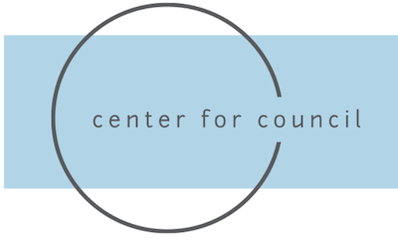Just recently, Mathew was released from prison and is reintegrating back into his former community. His story is similar to many inmates who participate in the Center for Council Inmate Council Program. For three years now, Center for Council has provided programs inside prisons across the state of California, teaching inmates to practice and facilitate this work. Council programs have been proven to decrease aggression, heighten one’s sense of empathy and compassion, and help those who participate to find their voice. All of these skills benefit both the individual and the community at-large.
In September Mathew spoke about his experience with Council and how important it was for him to participate in and facilitate Council circles for fellow prisoners. Mathew opened up about the difference between Council and other rehabilitative programs and how, through learning to work with Council and listen and speak from the heart, he was able to experience meaningful rehabilitation.
0 Comments
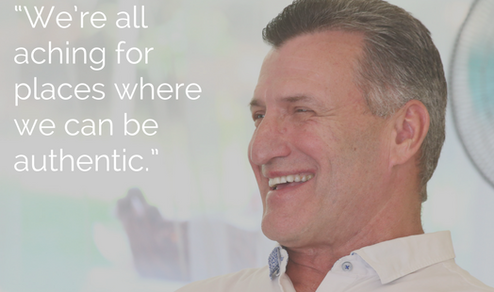 Randy has been the warden at both Correctional Training Facility and Salinas Valley State Prison, in Soledad, California; he is currently a Commissioner on the Board of Parole Hearings. After learning about the practice of Council and witnessing the transformation and shift in attitudes of the prisoners who participated in the Inmate Council Program, Randy facilitated a circle with his correctional facility staff. It was an informal circle, around a small conference table in his office, but the effect of that single practice was no less profound. In a working environment where being vulnerable is discouraged, where the traumas and stresses that one is exposed to while on the job can be overwhelming, Randy knew how important it was to create a space for his employees to be able to be open and honest. Correctional staff and officers who work within prisons are experiencing very high rates of work-induced anxiety and stress, often resulting in symptoms mimicking those of soldiers returning from war zones. Randy was struck by the openness and candor of his staff during their Council circles. Council provided a space for them to individually and collectively process some of the things they had witnessed on the job, as well as to reconnect with one another in a supportive and uplifting way.
Center for Council is now beginning to work with law enforcement officers, training them in the practice of Council so they will be able to facilitate circles themselves. Council is an adaptable, generative practice, serving all communities and circumstances. Through the transformation of individuals who participate, who share their stories and listen deeply to the stories of others, the entire community can feel the effects of the change. In September, Randy spoke about his experience with Council and how important it was for him to facilitate Council circles for his staff.
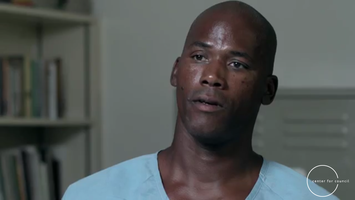 Edward encountered Council for the first time at Ironwood State Prison. He was one of the first participants to sign up for the Prison Council Initiative there and became a leader within the group after completing both the Council 1 and Council 2 training workshops offered by Center for Council trainers. Edward was incarcerated for 27 years before being called for an interview this summer before the Board of Parole Hearings. That interview led to the granting of parole and Edward is now in the process of reintegrating himself into the San Diego community. Edward credits the success of his rehabilitation efforts, and the granting of parole, to skills and perspectives he learned in the workshops and practice groups offered by the Prison Council Initiative. When CDCR’s Office of Public Communications arranged for Center for Council to videotape inmate testimonials about the impact of the program, we were struck by Edward’s extraordinarily clear and insightful perspective. His articulation of the power of the work of Council remains a highlight of the short film on the Prison Council Initiative (find the link below). Center for Council caught up again with Edward recently and asked him to share his thoughts on the reentry process and how the practice of Council has helped him transition back into the world outside the prison gates. Edward’s passion and positivity is contagious; it is apparent that he doesn’t take a thing for granted. Center for Council: Edward, could you tell us about your experience in general with Council and what it has meant to you?
Loren: I work at a non-profit youth center called Heart of Los Angeles, or HOLA. I’m Senior Program Director, head of the Leadership Department, and I help to coordinate summer programs here. I’ve been with HOLA for 16 years, and I came to this work with a background in theatre, so I started off incorporating a lot of theatre games that I’ve noticed, in the world of Council, are also commonplace: ice breaker games, team-building activities, etc. I used those activities to build communication skills, connection between the kids, and jumpstart some self-reflection.I was first referred to Council from a friend at Crossroads School who recommended the book, “The Way of Council” -- and it felt familiar to me right away. I started incorporating aspects of it, and started implementing Council to the best of my ability, without any training, here and there in the organization’s programming.
I think it was about two years ago, our Executive Director told me we had an opportunity, through Center for Council’s Social Justice Council Project, to train the HOLA staff in the practice of Council. I enthusiastically supported that idea and helped to organize training of our directors and coordinators, around 30 staff members total, in January of 2016. The Social Justice Council Project experience was great, for me personally, to get that depth of understanding, but also for the rest of the staff to learn how to be in circle with each other. Our staff meetings are pretty Council-like to begin with, so it felt really right for us to have this as a practice within the organization. There were a few of us who formed a Council committee and, with support from Center for Council, we were convening monthly Council sessions amongst the staff. It kind of faded a bit over time due to people changing jobs and moving around. But when I joined Center for Council’s Trainer Leadership Initiative, I started again offering a monthly Council session and invited anyone who wanted to participate. I’ve been doing that for about three months and those circles have been really deep and meaningful in terms of the quality of sharing. I think having that foundation with the initial training, and a little bit of time, and a bit of new energy has made those circles really powerful. I think especially among some newer staff members, having that regular practice has given them a sense of the possibility of sharing that can happen both with staff and with the youth that we serve. In a space where everyone is activity-, task- and goal-oriented, where interactions can be somewhat superficial in terms of just coordinating tasks and getting things done, offering the staff members a space where they could slow down and really be with each other, and share a little bit of their inner lives with one another, has had an impact on the staff members. Their sense of what’s possible has grown, through the work that we’re doing and the depth of connection that we can have with the students, as well as with each other. And the strength that we gather from connecting with each other and hearing each other’s stories, really seeing each other, the depth of humanity that we can see in each other when we slow down and spend time with each other… Center for Council: After you’ve participated in Center for Council’s Trainer Leadership Initiative, have you continued to introduce the practice of Council or aspects of it in your programming with youth? Loren: Yeah, absolutely. That was part of the reason to reignite the Council practice with the staff. There were a number of staff members that were using Council within youth programming but they had moved on, so we wanted to give newer staff members the opportunity to experience Council so that they too could implement it in the programs they run for youth. One of our newer staff members who has been a regular participant in our monthly staff Council, took it upon herself to lead a Council circle with parents of students in our elementary program, co-facilitated by someone who was a part of the original Social Justice Council Project training. That went really well and was pretty special. It was the first time we had Council with parents. I’ve been incorporating Council in the programming that I run for many years, and will continue to do so. In Play for Peace, I conduct Council with the youth facilitators on a regular basis. It enables them to get to know one another better, to practice being in Council, and gives them the opportunity to lead circles with my assistants when they lead their activities with younger students. Which they do. And it is really cool to see high school students in circle, co-facilitating Council for younger students. Center for Council: It’s very much in line with one of Center for Council’s main principles of training the trainers and creating a practice that is constantly evolving and adapting to fit the people that are practicing. Yeah! I was actually able to participate in one of the Inmate Council Program trainings over the summer, as an intern. It was there that that idea sank into me a little deeper; how, when a group of people gets trained, the facilitation then belongs to that group rather than to an “expert.” You know, Council belongs to you. I could see that in the way that the inmates were being trained. That was kind of an “aha” moment for me. That was what was given to us as a staff in the Social Justice Council Project: when we received our training, we no longer needed Center for Council to come out here and tell us how to do it. That was the impetus for me to revive the monthly staff Council circle here. I thought, if we’ve got a core group that has already been trained in the Council practice, and we could develop a new group here, I would no longer need to be the expert. I would love to hand off facilitation to someone else. It develops the sense that we are all on an equal level, especially within the circle. I would love for the circle to take care of itself. I want to see that the youth facilitators feel empowered to own that process, and they’re not just answering questions to an authority figure, they are responding to inquiries from their peers. I feel like that level of circle-sharing is the deepest, where we really level the playing field. |
Categories
All
Archives
March 2024
|
|
|
About |
|

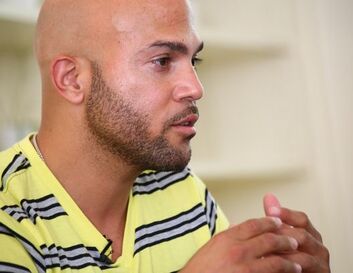
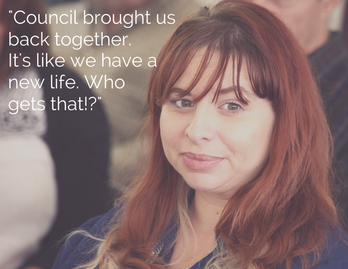
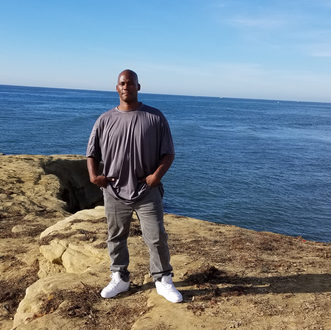
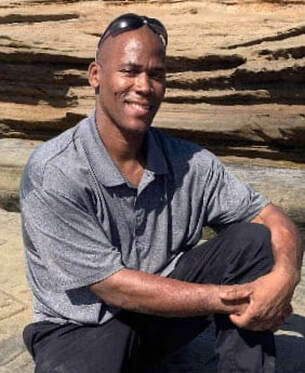

 RSS Feed
RSS Feed
